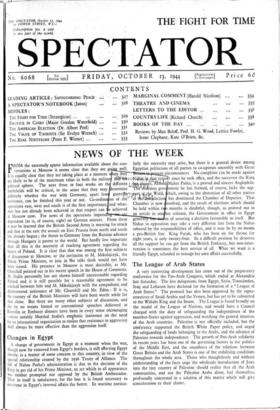Changes in Egypt
A change of government in Egypt at a moment when the war, though now far removed from Egypt's borders, is still affecting Egypt closely, is a matter of some concern to this country, in view of the special relationship created by the 1936 Treaty of Alliance. The fall of Nahas Pasha's administration is due to the decision of the King to get rid of his Prime Minister, an act which to all appearance Was neither prompted nor opposed by the British Ambassador. That in itself is satisfactory, for the less it is found necessary to intervene in Egypt's internal affairs the better. In wartime particu- FROM the extremely sparse information available about the con- larly the necessity may arise, but there is a general desire among versations at Moscow it seems clear that they are g well. Egyptian politicians of all parties to co-operate smoothly with Great
political sphere. The next three or four weeks on th Maher Pasha, is a proved and sincere Anglophile.
battlefields will be critical, in the sense that they may nment he has formed, of course, lacks the sup-
different LV n, d •
etermine Yition gove It is equally clear that they are taking place at a moment circumstances. No complaint can be made against
are likely to be of the maximum value in both the milit t since he took office, and the successor the King
Ap** 'NOW 411111 Tre nt
guerrikc tvepprt, 44e Wafd, on of the "at theibilit4electio and what- Chamber is now
e achieved be held within t an article in ano hich, owing to the abstention of all other parties has dominated the Chamber of Deputies. That issolved, and the result of elections which should months is doubtful, though, as pointed out in er column, the Government in office in Egypt gener ns of securing a decision favourable to itself. But Nahas in opposition may take a very different line from the Nahas sobered by the responsibilities of office, and it may be by no means a pro-British line. King Faruk, who has been on the throne for eight years, is only twenty-four. In a difficult position he deserves all the support he can get from the British Embassy, but non-inter- vention is sometimes the best service of all. What we want is a friendly Egypt, schooled to manage her own affairs successfully.


























